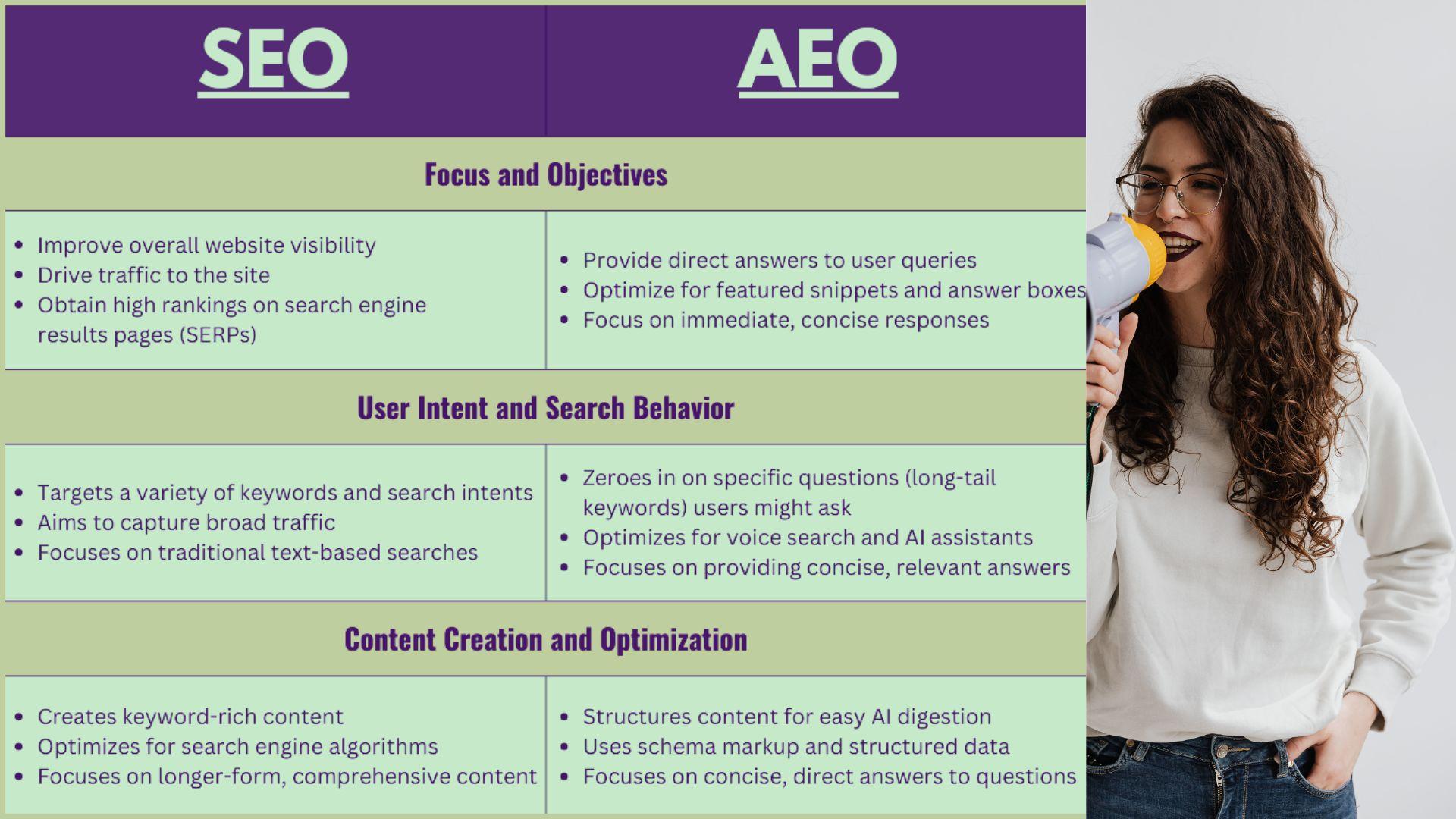Why people using AEO instead of SEO ?

People are increasingly focusing on AEO (Answer Engine Optimization) over traditional SEO (Search Engine Optimization) because of changes in how users interact with search engines and advancements in AI-powered search algorithms. Here’s why AEO is gaining traction:
1. The Rise of Voice Search and Conversational AI
- With the rise of voice assistants (like Alexa, Google Assistant, and Siri) and conversational AI, people are searching in more natural, question-based formats. AEO focuses on optimizing content to directly answer user queries, making it more suitable for voice search, which often returns single, concise answers.
2. The Dominance of Featured Snippets and Zero-Click Searches
- Google and other search engines increasingly display featured snippets (direct answers shown at the top of search results) to answer questions directly. AEO helps websites structure their content to capture these snippets, providing direct answers and increasing visibility without needing a traditional SEO ranking position.
3. User Intent and Answer-Centric Content
- AEO emphasizes understanding and addressing user intent—creating content that answers specific questions thoroughly. This aligns with how search engines are becoming more intent-driven, trying to deliver not just relevant pages but clear, precise answers to user questions.
4. AI-Enhanced Search Algorithms
- Modern search engines utilize AI algorithms (like Google’s BERT and MUM) that prioritize understanding natural language and context. AEO is tailored to these advanced algorithms by providing structured, answer-focused content that AI can interpret more effectively.
5. Increased Focus on User Experience and Relevance
- Search engines are also focusing more on user experience metrics (like bounce rates, time on page, and engagement). AEO encourages the creation of concise, relevant, and engaging content, which aligns with users’ preferences and reduces bounce rates by directly answering their questions.
6. Structured Data and Rich Results
- AEO often uses structured data (like schema markup) to help search engines understand the content better, leading to rich results (such as FAQs, recipes, how-tos). Structured data supports AEO by providing content in a way that search engines can easily parse, enhancing the chances of appearing in rich results.
What is replacing SEO?
While SEO (Search Engine Optimization) isn’t necessarily being replaced, it is evolving and expanding to include new concepts and practices that reflect shifts in search technology, user behavior, and AI advancements. Here’s a look at some of the emerging fields that are complementing and, in some cases, transforming traditional SEO:
1. AEO (Answer Engine Optimization)
- AEO focuses on optimizing content to provide direct, concise answers to user questions, especially with the rise of voice search and conversational AI (e.g., Alexa, Siri, Google Assistant). It aims to get content featured in answer boxes and featured snippets to address queries directly, which is key as more users want immediate answers.
2. Experience Optimization (EXO)
- Search engines are increasingly prioritizing user experience (UX) in rankings, as seen with Google’s Core Web Vitals metrics that assess page loading speed, interactivity, and visual stability. EXO involves ensuring fast loading times, a mobile-friendly design, and user-centric content to optimize the overall user journey, which directly impacts search rankings.
3. Entity Optimization
- As search engines move towards entity-based search (recognizing concepts, people, places, and things rather than keywords alone), content creators are focusing on entity optimization. This means structuring content around recognized entities and relationships within knowledge graphs, enabling search engines to better understand the content and its relevance to user queries.
4. Content Quality and E-E-A-T (Experience, Expertise, Authority, Trustworthiness)
- Search algorithms now place more emphasis on the quality and credibility of content, especially in Your Money, Your Life (YMYL) categories like health and finance. Optimizing for E-E-A-T (Google's guidelines for Experience, Expertise, Authority, and Trustworthiness) requires producing reliable, expert-driven content, particularly for topics that impact users’ well-being or finances.
5. Conversational AI and Chatbot Optimization
- AI-driven tools like ChatGPT and Google’s Bard are becoming popular for information retrieval. Marketers are now optimizing content for AI-driven responses, aiming to be included in AI outputs by structuring information clearly and semantically, with a focus on question-and-answer formatting that aligns with AI conversational models.
6. Visual and Multimodal Search Optimization
- Visual search (like Google Lens) and multimodal search (which combines text, images, and voice) are on the rise, with users increasingly searching using images or a mix of media types. SEO is adapting to include image optimization, metadata for multimedia, and visually rich content to capture traffic from these sources.
7. Voice Search Optimization
- With the popularity of voice-activated devices, optimizing content for voice search has become critical. Voice search queries are often longer, more conversational, and question-based, so the content must reflect this to meet voice-search algorithms effectively.
8. Semantic SEO and Topic Clustering
- Traditional SEO is shifting from keyword-focused optimization to semantic SEO, where content is grouped into topic clusters that provide comprehensive coverage of a subject. This structure helps search engines understand content relevance and depth, improving authority on specific topics and potentially boosting rankings for related queries.
Integrating SEO and AEO is a powerful approach for businesses aiming to strengthen their digital marketing strategy. Here’s how combining both can produce tangible results:
-
SEO for Broad Visibility: Traditional SEO enhances a site’s overall visibility by focusing on keyword optimization, on-page elements, backlinks, and technical aspects that help a website rank on search engine results pages (SERPs). This draws in a wide range of organic traffic and establishes domain authority.
-
AEO for Targeted User Intent: AEO zeroes in on user intent, particularly for question-based searches and voice queries. By providing concise, direct answers, AEO helps businesses capture featured snippets and position zero results, meeting the growing demand for immediate, relevant answers.
-
Enhanced User Experience: With SEO focusing on driving traffic and AEO delivering precise answers, businesses can offer a seamless experience for users, whether they’re looking for in-depth information or quick responses. This combination aligns with user experience (UX) priorities that search engines value.
-
Voice and Visual Search Optimization: As voice and visual searches continue to grow, AEO’s focus on natural language and structured answers complements SEO’s traditional methods, making it easier to optimize for these emerging search types.
-
Higher Engagement and Conversions: By integrating both strategies, businesses not only increase visibility but also ensure users find relevant information faster. This dual approach keeps users engaged, reduces bounce rates, and improves conversion potential.
-
Building Long-Term Brand Authority: SEO builds authority over time, while AEO positions the brand as an authoritative source for direct answers. Together, they reinforce brand credibility and trustworthiness, which is essential for long-term growth.
- Web Development
- Art
- Causes
- Crafts
- Dance
- Drinks
- Film
- Fitness
- Food
- Games
- Gardening
- Health
- Home
- Literature
- Music
- Networking
- Other
- Party
- Religion
- Shopping
- Sports
- Theater
- Wellness




